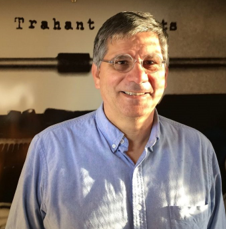Minnesota regulators give OK for a Line 3 pipeline; Protectors vow to stop it
Mark Trahant
Indian Country Today

Winona LaDuke: Winona LaDuke, executive director of the Honor the Earth, said there will be more regulatory fights ahead. “They have gotten their Standing Rock.’ (Honor the Earth photo via Facebook)
Pipeline, if built, would pump Canadian tar sands oil through wild rice areas in Minnesota
Regulators for the state of Minnesota Thursday approved a pipeline that will pump Canadian tar sands oil through wild rice areas to refineries and markets.
The Public Utilities Commission approved a certificate of need for Enbridge Inc.’s pipeline project in a 5-0 vote and signed off on a pathway for the conduit that hewed closely to Enbridge’s preferred route on a 3-2 vote.
Tribes and environmental groups are opposed to the project. In a statement Thursday the Fond du Lac Tribe said it would appeal the decision.
“The Fond du Lac Band is prepared to appeal this decision and we will evaluate our options as we receive the full written decision from the Commission. In the meantime, our employees will continue their critical work surveying for tribal cultural properties that must be protected along the route of the pipeline expansion proposed by Enbridge,” the tribe said in a news release.
“A broad coalition of tribal and other voices have come together to oppose this project because of the uniquely potent threats it poses to natural resources critical to both Indians and non-Indians in Northern Minnesota,” the tribe said.”It is imperative that we not allow places like Big Sandy Lake, the Moosehorn River, and the Fond du Lac State Forest to be sacrificed so that a Canadian oil company can profit. The 1854 Ceded Territory is one of the last great places left on this Earth, and the Band will stand with our neighbors and continue to defend the Ojibwe homeland against all the threats it may face.”
Winona LaDuke, executive director of the Honor the Earth, said there will be more regulatory fights ahead. “They have gotten their Standing Rock,” she said. (LaDuke on the “windigo” economy.”)
The Stop Pipeline 3 coalition issued a news release: “We have seen the blatant racism that the commissioners have shown the native peoples of this land, they chose not to listen to the 5 impacted tribes that intervened, the 94 percent of public comments that were against this pipeline, and the thousands of people that have done direct and peaceful actions against the construction of this pipeline. The wild rice, climate, the water, and the lives of thousands of indigenous peoples of Minnesota are at stake. No matter what, we must keep fighting. The governor and many of our representatives are on our side, this isn’t the end only a beginning. Stay tuned for more actions and ways to continue to fight line 3 and stay apart of this fight at www.stopline3.org.”
Enbridge and pipeline supporters said the vote was a victory for Canada’s oil industry because the Line 3 project would eventually carry about 370,000 more barrels of heavy and light crude a day from Hardisty, Alberta, to a storage hub in Superior, Wisconsin. “Projects like this help us make sure we’re getting product to market, which is good for Canada,” Enbridge Chief Executive Officer Al Monaco told Bloomberg News. The pipeline, if built, would double the capacity of the oil flow. The project still requires permits the state’s Department of Natural Resources and Pollution Control agency as well as the federal Army Corps of Engineers.
Indeed, the Bloomberg story’s lede reflects the view of many investors in the project: “Canada’s oil industry just moved one step closer to getting some relief from its pipeline woes.”
However, the chair of the Public Utility Commission, Nancy Lange, said on Minnesota Public Radio that she was conflicted about allowing fossil fuels to cross the state for decades to come. “How would I feel if I woke up in five years and that line had leaked?” she said, referring to the possibility that the old Line 3 would continue operating, despite safety risks, if commissioners denied the proposal to replace it.
Minnesota Public Radio said the conditions placed on the certificate of need — and a later decision about the new Line 3 route — will influence whether and how soon the company can move forward.
Mark Trahant is editor of Indian Country Today. He is a member of the Shoshone-Bannock Tribes. Follow him on Twitter – @TrahantReportsEmail: mtrahant@IndianCountryToday.com


